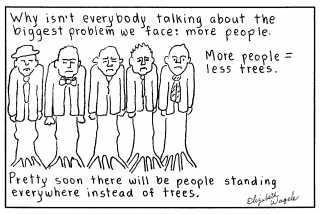
Genetics
Is the Achiever My Genes, My Upbringing, or Me?
Scientists say even the way we vote is highly genetically determined.
Posted October 16, 2012
Cartoon by Elizabeth Wagele

Cartoon by Elizabeth Wagele
The Genetics of Politics
Evidence in this article comes from studying identical twins, who share all their genes, and fraternal twins, who share about half their genes. Peter Hatemi and Rose McDermott published a review of the field in Trends in Genetics in September that shows the predisposition to acquire political knowledge is highly genetically determined while identification with a particular political party is more a question of family upbringing.
The same article explains that Dr. James Fowler of UC San Diego found a gene variant of dopamine, DRD4-7R, when combined with the person having a large group of friends, tends to produce novelty-seeking behavior and a liberal political viewpoint. The novelty-seeking behavior is most typical of Enneagram type 7, the Adventurer.
Dr. Fowler also found people with another dopamine receptor, DRD2, and 5HTT, which regulates serotonin levels, are more likely to vote than those with low-activity levels. Which Enneagram type is the most likely to vote? The type that most follows rules, type One – the Perfectionist.
In another science article, serotonergic genes in the Korean population were found to have an influence on personality. One result suggested that 5-HT2A receptor gene appears to be associated with self-determinism and self-transcendence. The 5-HT6 receptor gene was also associated with self-transcendence. This, to me, is especially related to the One-Perfectionist personality. Other Enneagram types who try hard or who accomplish a lot could have this receptor too.
The same study found gene 5-HTTLPR may have a small influence on the trait of anxiety. The Enneagram type most noted for anxiety is type Six, the Questioner.
Even stuttering is linked to the serotonin transporter gene polymorphism (5-HTTLPR) and the trait anxiety. (STUT1 maps to chromosome 18q; STUT2 maps to chromosome 12q24; STUT3 maps to chromosome 3q; and STUT4 maps to chromosome 16q. 1 to 2% of adults stutter.) 15% of children from 4 to 6 stutter and 1 to 2% of adults stutter. Let me guess that the Enneagram types that stutter the most are the 5-Observer and the 6-Questioner.
Genes and environment may have an impact on the way we vote and our personalities, but luckily we’re still each unique individuals, all 7 billion of us. (Well, I can’t say how unique every person who is enslaved and treated inhumanely is able to feel, but if you can read this blog hopefully you have a fairly good life.) If and when the world population reaches 15, 20, or 50 billion people, will the living conditions on Earth prevent many of us from feeling the incredible spark of individuality, being able to express individuality, or being able to appreciate one another’s individuality? Or will our refusal to face overcrowding and the health of our Earth have left us with not enough space to be our free, creative selves or even to feel human?
Please visit Elizabeth’s improved Famous People page and subscribe to this and her other blog.

